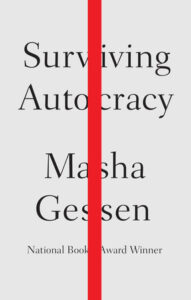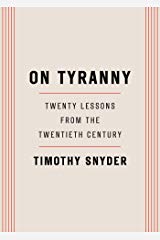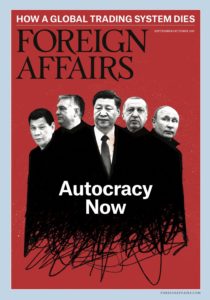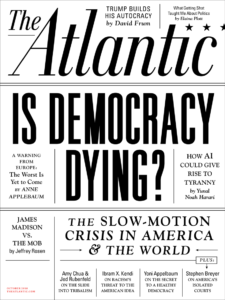autocracy
#MustRead from Anand
October 29, 2020Last exit before autocracy
A conversation with Masha Gessen on how to prevent “autocratic breakthrough,” why Russiagate was a “crutch” for the left, and what really happened in that New Yorker election s(t)imulation Zoom
A reelected Donald Trump, abetted by a 6-3 Supreme Court, is truly a terrifying prospect — very possibly the end of the American republic in any real sense. But we are not there yet. Where we are, in fact, is in the liminal space where it is still possible to achieve a different future.
This looming election may well be the last exit before autocracy.
That was one of the things I carried away from my conversation with the brilliant Masha Gessen, whose wisdom I’m so happy to be sharing with you today. This era has revealed its share of charlatans and criminals and fools. But it has also revealed genuine heroes — including intellectual ones. One of mine is Masha.
Masha is a journalist and writer and thinker who spent the first part of their career in Russia, writing about science, democracy, autocracy, and disease. Then they made a home in America, where it turned out that some understanding of science, democracy, autocracy, and disease would prove very handy.
Masha was made for this moment. To be clear, given their interests, you actually never want to be living in a time and place that Masha was made for, but here we are.
The question is what happens next. If he, God willing, wins, I think that in some ways Biden can be a transformative president, because I think that there’s a grand ambition there, that’s become very clear, to invest in infrastructure, to create a new welfare state, to bring the country together in some really, I think, beautiful ways.
What gives me hope is distinct from the question of whether I’m optimistic. I can be incredibly pessimistic, but hope is a necessity of survival and a moral imperative. I hope because I have to, because a better future is possible. The foundational requirement for it is hope.
Full Q&A
https://the.ink/p/how-to-block-an-autocratic-breakthrough
Masha:
I use the word autocracy intentionally, instead of authoritarianism, for two reasons. One is because I’ve spent so much of my life writing about totalitarianism that, in that context, authoritarianism is something distinct from totalitarianism. Authoritarianism is a kind of regime in which basically the ruler wants people to go home and tend to their private lives while they run the country. So nothing is political under authoritarianism; everything becomes private. Politics as such disappears.
Under totalitarianism, it’s the opposite. The totalitarian leader wants people out in the public square at all times, demonstrating their support for him. Under totalitarianism, nothing is private; everything is political. It’s the private that disappears.
So let’s stick with autocracy. Where are we in the autocratic arc? I hope we’re at the stage of the autocratic attempt. If there’s a spectacular failure of this election, not a failure as in Donald Trump wins, but a failure as in, he doesn’t leave office because he can abuse the courts, abuse the power of the courts and secure being able not to leave office that way, because he can create enough chaos to throw election results into enough doubt that he doesn’t leave office — if there is an actual engineered failure of the election, then we have already passed the point of no return, the point of autocratic breakthrough. So I don’t actually know the answer. I very much hope that we’re at the point of an autocratic attempt, and that attempt will be reversed because we vote him out of office.
Brooklyn has a plan to fix democracy
The borough’s proposal for a 28th Amendment to the U.S. Constitution
The 28th Amendment — a proposal
Whereas the government of the United States should represent all of the people of the United States equally,
ction 1. The Electoral College shall be abolished and the President selected by popular vote; Senate membership shall be reallocated to reflect more accurately the distribution of the national population, with a minimum of one seat per state; Election Day shall be a national holiday; elections shall be publicly financed. All citizens of the United States, including those living in its territories and the District of Columbia, shall have the same electoral rights and representation as residents of a State; all citizens of voting age shall have the unencumbered right to vote in federal, state, and local elections. Congress shall have the power and obligation to enforce these provisions by appropriate legislation.
Section 2. In recognition of the inherent dignity of all persons, Congress shall have the power and obligation to enact appropriate legislation to secure all rights guaranteed in the Universal Declaration of Human Rights, including the right to education, healthcare, housing, employment, food security, and a clean and healthy environment.
—
Seth Godin
The successful scientist
The scientific method is the most powerful invention humans have ever created. It’s not just for people in white coats and in labs. The scientific method has changed what we wear, what we eat, the health of our families, the way we earn a living–the world as we know it is a result of a simple process of hypothesis, testing and explanation.
Unfortunately, school and other systems in our world focus on just one or two of the elements necessary to do it well.
- Know the rules, maxims and outcomes that came before. Do the reading, score well on the test.
- Understand the thinking behind these rules, so you can dive deeper and either change the rules or expand on them.
- Do tests that others haven’t thought of or that people don’t think will work. Intentionally create falsifiable hypotheses, knowing that you might be wrong, and then go test them.
- Publish your results so that others can examine your work and improve it. Show your work. Invite correction and improvement.
- Explain what you did clearly so that it becomes part of the canon, so it can be used by others, until it’s replaced by something even more useful.
There are very few contentious arguments in our world today that couldn’t be more quickly resolved if all involved were willing to act in good faith and work their way through the steps together.
Because if you seek to lead or to change minds, if you’re working for better, then you’re a scientist.
We have been naive as a country not to believe him.
February 13, 2020He said he would destroy the institutions, and he is.
“Democracy dies in darkness.”
“Post-truth is pre-fascism.”
―
“The United States is so powerful that the only country capable of destroying her might be the United States herself, which means that the ultimate terrorist strategy would be to just leave the country along. That way, America’s ugliest partisan tendencies could emerge unimpeded by the unifying effects of war.”
-Sebastian Junger, On Homecoming and Belonging
Trump seeks to bend the executive branch as part of impeachment vendetta
“I’ve never seen so many prosecutors, including those who aren’t political or those who haven’t been following this situation closely, go to red alert so quickly,” said Joyce White Vance, a former U.S. attorney in the Obama administration. “The reason is this: If a president can meddle in a criminal case to help a friend, then there’s nothing that keeps him from meddling to harm someone he thinks is his enemy. That means that a president is fully above the law in the most dangerous kind of way. This is how democracies die.”
“Now he understands how to use the full powers of the presidency. The pearl-clutchers better get used to it.” – Former chief strategist Stephen K. Bannon
November 10, 2016:
Autocracy: Rules for Survival
https://www.nybooks.com/daily/2016/11/10/trump-election-autocracy-rules-for-survival/
“Thank you, my friends. Thank you. Thank you. We have lost. We have lost, and this is the last day of my political career, so I will say what must be said. We are standing at the edge of the abyss. Our political system, our society, our country itself are in greater danger than at any time in the last century and a half. The president-elect has made his intentions clear, and it would be immoral to pretend otherwise. We must band together right now to defend the laws, the institutions, and the ideals on which our country is based.”
That, or something like that, is what Hillary Clinton should have said on Wednesday. Instead, she said, resignedly,
We must accept this result and then look to the future. Donald Trump is going to be our president. We owe him an open mind and the chance to lead. Our constitutional democracy enshrines the peaceful transfer of power. We don’t just respect that. We cherish it. It also enshrines the rule of law; the principle [that] we are all equal in rights and dignity; freedom of worship and expression. We respect and cherish these values, too, and we must defend them.
Hours later, President Barack Obama was even more conciliatory:
We are now all rooting for his success in uniting and leading the country. The peaceful transition of power is one of the hallmarks of our democracy. And over the next few months, we are going to show that to the world….We have to remember that we’re actually all on one team.
[…]
The second falsehood is the pretense that America is starting from scratch and its president-elect is a tabula rasa. Or we are: “we owe him an open mind.” It was as though Donald Trump had not, in the course of his campaign, promised to deport US citizens, promised to create a system of surveillance targeted specifically at Muslim Americans, promised to build a wall on the border with Mexico, advocated war crimes, endorsed torture, and repeatedly threatened to jail Hillary Clinton herself. It was as though those statements and many more could be written off as so much campaign hyperbole and now that the campaign was over, Trump would be eager to become a regular, rule-abiding politician of the pre-Trump era.
Rule #1: Believe the autocrat. He means what he says. Whenever you find yourself thinking, or hear others claiming, that he is exaggerating, that is our innate tendency to reach for a rationalization. This will happen often: humans seem to have evolved to practice denial when confronted publicly with the unacceptable. Back in the 1930s, The New York Times assured its readers that Hitler’s anti-Semitism was all posture. More recently, the same newspaper made a telling choice between two statements made by Putin’s press secretary Dmitry Peskov following a police crackdown on protesters in Moscow: “The police acted mildly—I would have liked them to act more harshly” rather than those protesters’ “liver should have been spread all over the pavement.” Perhaps the journalists could not believe their ears. But they should—both in the Russian case, and in the American one. For all the admiration Trump has expressed for Putin, the two men are very different; if anything, there is even more reason to listen to everything Trump has said. He has no political establishment into which to fold himself following the campaign, and therefore no reason to shed his campaign rhetoric. On the contrary: it is now the establishment that is rushing to accommodate him—from the president, who met with him at the White House on Thursday, to the leaders of the Republican Party, who are discarding their long-held scruples to embrace his radical positions.
Rule #3: Institutions will not save you. It took Putin a year to take over the Russian media and four years to dismantle its electoral system; the judiciary collapsed unnoticed. The capture of institutions in Turkey has been carried out even faster, by a man once celebrated as the democrat to lead Turkey into the EU. Poland has in less than a year undone half of a quarter century’s accomplishments in building a constitutional democracy.
Of course, the United States has much stronger institutions than Germany did in the 1930s, or Russia does today. Both Clinton and Obama in their speeches stressed the importance and strength of these institutions. The problem, however, is that many of these institutions are enshrined in political culture rather than in law, and all of them—including the ones enshrined in law—depend on the good faith of all actors to fulfill their purpose and uphold the Constitution.
Rule #6: Remember the future. Nothing lasts forever. Donald Trump certainly will not, and Trumpism, to the extent that it is centered on Trump’s persona, will not either. Failure to imagine the future may have lost the Democrats this election. They offered no vision of the future to counterbalance Trump’s all-too-familiar white-populist vision of an imaginary past. They had also long ignored the strange and outdated institutions of American democracy that call out for reform—like the electoral college, which has now cost the Democratic Party two elections in which Republicans won with the minority of the popular vote. That should not be normal. But resistance—stubborn, uncompromising, outraged—should be.
“The Founding Fathers tried to protect us from the threat they knew, the tyranny that overcame ancient democracy. Today, our political order faces new threats, not unlike the totalitarianism of the twentieth century. We are no wiser than the Europeans who saw democracy yield to fascism, Nazism, or communism. Our one advantage is that we might learn from their experience.
On Tyranny is a call to arms and a guide to resistance, with invaluable ideas for how we can preserve our freedoms in the uncertain years to come.”
“The president is a nationalist, which is not at all the same thing as a patriot. A nationalist encourages us to be our worst, and then tells us that we are the best. A nationalist, “although endlessly brooding on power, victory, defeat, revenge,” wrote Orwell, tends to be “uninterested in what happens in the real world.” Nationalism is relativist, since the only truth is the resentment we feel when we contemplate others. As the novelist Danilo Kiš put it, nationalism “has no universal values, aesthetic or ethical.” A patriot, by contrast, wants the nation to live up to its ideals, which means asking us to be our best selves. A patriot must be concerned with the real world, which is the only place where his country can be loved and sustained. A patriot has universal values, standards by which he judges his nation, always wishing it well—and wishing that it would do better. Democracy”
“A nationalist will say that “it can’t happen here,” which is the first step toward disaster. A patriot says that it could happen here, but that we will stop it.”
“Modern tyranny is terror management. When the terrorist attack comes, remember that authoritarians exploit such events in order to consolidate power. The sudden disaster that requires the end of checks and balances, the dissolution of opposition parties, the suspension of freedom of expression, the right to a fair trial, and so on, is the oldest trick in the Hitlerian book. Do not fall for it.”
“The mistake is to assume that rulers who came to power through institutions cannot change or destroy those very institutions—even when that is exactly what they have announced that they will do.”
“More than half a century ago, the classic novels of totalitarianism warned of the domination of screens, the suppression of books, the narrowing of vocabularies, and the associated difficulties of thought. In Ray Bradbury’s Fahrenheit 451, published in 1953, firemen find and burn books while most citizens watch interactive television. In George Orwell’s 1984, published in 1949, books are banned and television is two-way, allowing the government to observe citizens at all times. In 1984, the language of visual media is highly constrained, to starve the public of the concepts needed to think about the present, remember the past, and consider the future. One of the regime’s projects is to limit the language further by eliminating ever more words with each edition of the official dictionary.”
“You submit to tyranny when you renounce the difference between what you want to hear and what is actually the case.”
Everyday Colonialism
October 9, 2019The past is still present: why colonialism deserves better coverage
By Elliot Ross
Countries such as Britain and the USA also retain control over colonial territories. And let’s not forget the settler colonial countries such as Canada, Australia, New Zealand, and the United States, where the colonisation of indigenous lands has been entrenched and institutionalised in the long-term.
Colonial domination not only shapes our ideas about race, but also strongly influences how people think about class, culture, gender, and sexuality
The roots of autocracy and corrupt government run deep. Purely cultural, ahistorical explanations not only risk reproducing racist tropes, they mask the role of powerful international corporate interests in sustaining systems of resource extraction, profiteering, exploitation and rent-seeking that sustain the underlying economic transactions that has always made colonialism financially profitable for colonisers.
Everyday Colonialism is also about probing my own status as a beneficiary of these long histories
The age of dictators.
August 13, 2019Courtesy Foreign Affairs
Foreign Affairs editor Gideon Rose writes in the September/October issue that the leaders of Russia, China, Turkey, the Philippines and Hungary all “fought their way from obscurity to the throne and then took a hard authoritarian turn”:
Historical eras tend to have characteristic leadership types: the fledgling democrats of the 1920s, the dictators of the 1930s and 1940s, the nationalist anticolonialists of the 1950s and 1960s, the gerontocrats of the 1970s, the fledgling democrats (again) of the 1980s and 1990s. Now we’re back to dictators.
The leading figures on the world stage today practice a brutal, smash- mouth politics, a personalized authoritarianism. Old-school strongmen, they do whatever is needed to grasp and hold on to power.
Essential reading.
September 21, 2018Cover to cover The Atlantic’s October issue is essential reading from some of the most varied minds in our country today. They were invited to explore the premise of democracy’s demise. Topics include autocracy, tribalism, James Madison’s ‘Madisonian mob factions’, tyranny, and America’s courts by writers Anne Applebaum, Supreme Court Justice Stephen Breyer, Jeff Rosen, David Frum, Amy Chua, and others. The links are pinned below.
A note from The Atlantic:
Though these ills can be seen most plainly in the style and behavior of a growing number of political leaders worldwide, their sources run deeper than that. The aim of this package is to diagnose their serenity and root causes.
Some of these causes are universal; some are unique to the United States. The essays are grouped to reflect this distinction, and then to consider solutions.
Sprinkled throughout are brief warnings about risks to democracy from The Atlantic’s archives–some prescient, some misplaced, and many all too relevant today.
These are some of the headlines, stories, and links.
Losing the Democratic Habit
Yoni Appelbaum
Americans once learned self-governance by practicing it constantly–in lodge halls, neighborhood associations, and labor unions. As participation in these institutions had dwindled, so had public faith in democracy. To restore it, we must return democratic practices to everyday life.
https://www.theatlantic.com/magazine/archive/2018/10/losing-the-democratic-habit/568336/
The Threat of Tribalism
Amy Chua & Red Rubenfeld
The constitution once united a diverse country under a banner of ideas. But partisanship has turned Americans against one another–and against the principles enshrined in our founding document.
https://www.theatlantic.com/magazine/archive/2018/10/losing-the-democratic-habit/568336/
Madison vs. The Mob
Jeffrey Rosen
The founders designed a government that would be insulted from the heat of popular sentiment, but they didn’t anticipate the unbridled passions of the digital age. Here’s how the constitutional order can survive.
https://www.theatlantic.com/magazine/archive/2018/10/james-madison-mob-rule/568351/
America’s Courts Can’t Ignore the World
Supreme Court Justice Stephen Breyer
The U.S. Constitution is an American document. And American law should look exclusively to American precedents. Right? Not so, a supreme Court Justice says. That approach sounds good in theory, but the laws of other countries have a bearing on our own–and the highest court in the land needs to take heed.
https://www.theatlantic.com/magazine/archive/2018/10/james-madison-mob-rule/568351/
Building an Autocracy
David Frum
Will American democracy survive DT? And will the midterms matter?
https://www.theatlantic.com/magazine/archive/2018/10/building-an-autocracy/568282/
—
Link to The Atlantic October issue:
https://www.theatlantic.com/magazine/toc/2018/10/












